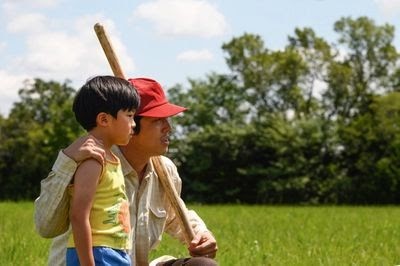Director Lee Isaac Chung’s “Minari” composes a heartfelt symphony of a Korean American family’s journey towards seeking their American dream.
After struggling in California, the Yi family move to Arkansas for a fresh start. Despite being united physically, each family member is divided on how to attain happiness in this foreign land.
For Jacob (Steven Yeun), the patriarch, it’s forcibly trying to find that gold mine of American success through his farm, treating the problems that surface for his family along the way as only fleeting.
RELATED: A conversation with ‘The Simpsons’ producer Rick Polizzi
Monica (Ye-ri Han), the mother, desperately tries to hold on to the pieces of her homeland, unwilling to let pieces of this foreign one in.
David (Alan S. Kim), the youngest of the family, sees immediately that his ethnicity makes him an outsider among his white peers. In an attempt to fit in, David pushes away his Korean ties.
Anne (Noel Kate Cho) is a bit more accepting of her Korean side than her brother David, but also faces difficulties with assimilation. While she is often annoyed with her younger brother’s antics, she often finds herself being a good older sister when it counts.
Soon-ja (Yuh-jung Youn), Monica’s mother and the children’s grandmother, arguably has the healthiest version of the American dream. Her planting of the minari serves as the film’s central metaphor: despite being a Korean plant, it can thrive in these foreign soils. The minari represents to the audience that the true American dream for immigrants should exist in a balance between cultures old and new; never forget who you are but know that you can grow anywhere.
Something worth mentioning as well is the friendship between Jacob and Paul (Will Patton), the local American farmhand willing to help the Yi family. Under any other circumstance, their companionship is unlikely. However, Paul’s religious eccentrics make him share a commonality with Jacob as they are both alienated from the world around them, furthering the film’s message that assimilation means a willingness to look past one another’s differences in order to find a kernel of similarity.
In A24 style, the film has a realist nature, showing the day-to-day struggles of the Yi family as the patriarch attempts to cultivate a farm. While the subject sounds mundane, the film nonetheless retains the ability to captivate its audience and find meaning in the seemingly meaningless.
RELATED: Our Blackness, Our Heritage step show celebrates Black culture and community
This is particularly showcased in the opening sequence. The camera follows David as he quietly stares out his car window at the foreign world around him, waiting for his new home to come into view. Coupled with a stunning soundtrack by Emile Mosseri, the audience is regressed to a child’s eyes and thus experience his curiosity as imagery of farm and quiet country life come passing by.
The sequence pattern of Mosseri’s soundtrack coupled with scenes of the family assimilating in their Arkansas home are common throughout the film. With the music and cinematography together, the audience is given a sense of the beauty in this mundane life, which emphasizes the strength that comes with family.
Because with every setback the Yi’s face together, whether it be with cultural differences or hardship on the farm, they have each other.
This message could not possibly have been conveyed without the work of the cast. Both Yeun and Han give incredible performances. Yeun and Han masterfully display the tension in their marriage as well as their individual character’s discomfort as they face this world they are so unfamiliar with.
RELATED: UA alumni form popular music trio SZN and release EP
Kim gives a performance worthy of praise as well. For being so young, Kim does a fantastic job at conveying the complicated emotions of a child desperate to belong.
Recently “Minari” has received quite the Academy Award buzz and with good reason. “Minari” moves into the awards season fresh off the heels of a controversial category win at the Golden Globes for Best Foreign Language Film
It is a film absolutely worth seeing, whether it be because of its beauty as showcased through the cinematography and soundtrack, or because its themes are ones that everyone can find solace in.
Just as minari can set its roots in any moistened soil, so can any audience member set their roots in “Minari.”
Follow Allison Fagan on Twitter















